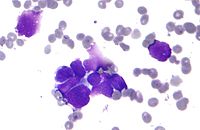
Photo from wikipedia
Previous studies have demonstrated that TP53 mutation is correlated with insufficient therapy response and unfavorable prognosis in acute lymphoblastic leukemia (ALL). Few studies have investigated the impact of TP53 mutation… Click to show full abstract
Previous studies have demonstrated that TP53 mutation is correlated with insufficient therapy response and unfavorable prognosis in acute lymphoblastic leukemia (ALL). Few studies have investigated the impact of TP53 mutation in ALL patients after haploidentical hematopoietic stem cell transplantation (haplo‐HSCT). We completed a retrospective study of 65 ALL patients with available TP53 status who underwent haplo‐HSCT. They were divided into a TP53 mutation group (TP53mut) and a TP53 wild‐type (TP53wt) group. TP53mut showed comparable 2‐year cumulative incidence of relapse (CIR) rates (13.1% vs 12.5%, P = .96) and 2‐year leukemia‐free survival (LFS) (74.2% vs 77.4%, P = .80) with TP53wt. No significant differences in 2‐year overall survival (OS) rates (82.9% vs 87.3%, P = .61) or 2‐year NRM rates (12.7% vs 10.2%, P = .69) were observed in TP53mut and TP53wt patients. Multivariate analysis suggested that white blood cell (WBC) count at initial diagnosis (>50 × 109/L: hazard ratio [HR] = 3.860, P = .016) and age (>40 years old: HR = 4.120, P = .012) are independent risk factors for 2‐year LFS. Our study showed that TP53 mutations may not be related to the unfavorable impact on survival in ALL patients after treatment with haplo‐HSCT. The present results suggested that haplo‐HSCT may eliminate the poor prognosis effect of TP53 mutation in ALL.
Journal Title: International Journal of Cancer
Year Published: 2022
Link to full text (if available)
Share on Social Media: Sign Up to like & get
recommendations!